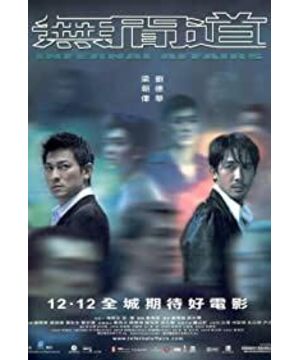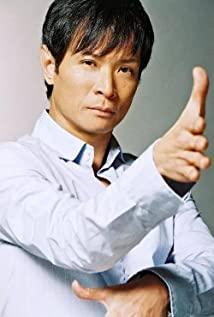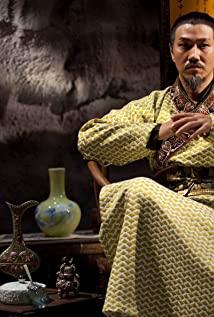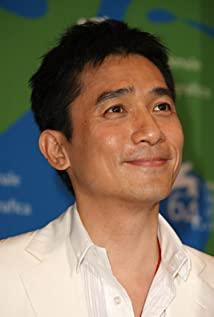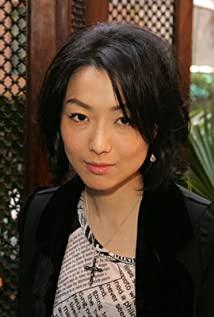In fact, I don't write film reviews. Most of the so-called film reviews I write are just some afterthoughts. The lack of some basic knowledge of the film makes it impossible for me to analyze and comment on the film's shooting, details, response methods and other technical techniques. As an audience, after sighing, I can only record some fragmentary feelings.
In fact, I don't really like watching Hong Kong police and gangster films, and my impression of them basically stays on such films as "Mong Kok Night" and "97 Young and Dangerous Series". At that time, after watching "Young and Dangerous", many male classmates shouted and killed with watermelon knives, and they all worshiped the elder brother and accepted the younger brother, dyed their hair a dazzling golden yellow, and selected the recognized " "Chen Haonan" later became king by occupying land, doing bad things everywhere, fighting and causing trouble, extorting money from classmates, pressing girls to the corner of the stairs for a strong kiss (actually, it was just a kiss, but for us at the time, it was as serious as losing one's body) . They buy sticky paper for fifty cents a piece and stick "fake tattoos" on their bodies with patterns of dragons and phoenixes, butterflies, or snakes, scorpions, and centipedes. . They were bare-chested, their ribs were visible, and they rocked their little bodies, calling each other "pheasant", "raven", etc. Usually, these students either entered the society after junior high school, or entered the juvenile detention center. So, at that time, I really didn't like these Hong Kong police and gangster films (I don't know if "Young and Dangerous" is a police and gangster film), and I always felt that these films taught my classmates bad.
As you know, there will be a "but" here. However, the reason why "Infernal Affairs" is so attractive to me is that it has a strong humanistic and literary character. My criteria for judging whether a film is good or bad is very simple, that is, after watching it, whether I was immersed in the plot for a long time and couldn't get out of it, or whether I sighed for it. After watching "Infernal Affairs", I still think about this film on the way back to Shanghai. So, I simply thought, well, yes, it looks good.
Officer Liu (fake police officer) played by Edison Chen and Andy Lau, and undercover officer (real police officer) played by Shawn Yue and Tony Leung, just like all movies and TV shows, there will always be good people and bad people, justice and evil as strong contradictions to promote the development of the story, The duty of the police, the love between the gangsters, the conflict between the dilemmas, the rivalry between men, and Cai Qin's "Forgotten Time" embellish it, which is what I call "humanistic color".
Good and evil, right and wrong, good and bad are actually decided in an instant, and there is no prior identity setting. You can't point to Tony Leung in the film and say "he's the good guy", point to Andy Lau and say, "He's the bad guy." I believe that every personality and temperament has its own internal reasons. As Fitzgerald recounted in the opening chapter of The Great Gatsby: "I remember a piece of advice my father gave me in my unworldly youth, which I still remember today," Whenever you want to open your mouth to criticize others,' he told me, 'don't forget that not all people in this world have the advantages you have." "The difference between good and evil is innate." What kind of person you become, and what kind of attitude you walk in the world, is probably not something you can choose based on your own will and effort. When people are born, they are already labeled with certain labels. It may take a lifetime of work to get rid of such a label.
Officer Liu (Chen Guanxi, Andy Lau) is
from Tun Village. When he was a teenager, he followed Brother Chen (Zeng Zhiwei) and became a pony. When he was born in this world, his family was already broken, he had no money, no book, no inherent values, he stubbornly had a crush on Sister Mary, and wanted to save money to buy a watch for her. This was probably his biggest dream back then. He is a small person on the streets of Hong Kong who cannot be found with a magnifying glass. Mixed in the crowd, there is no feature, at most a young gangster.
Sister Mary let him infiltrate the police and be an undercover agent. He didn't say anything else, just because he liked this woman. There is no ambition, no lofty aspirations, just because you like a woman, and do everything that will make her happy.
His life was not his own choice. His life is controlled by a pair of hands reaching out from a distance. His life is just a passage for certain purposes and certain plans. He has no right to frame his own life. He didn't think deeply about the complex issue of "good guys and bad guys". In the final shot, he said to Ah Ren (Leung Chao Wai, Shawn Yue) on the rooftop: "At that time, I had no choice."
At that time, he had no choice. If he could choose, he would choose the better life. Maybe I will study hard, I will get a decent job, I will have a life where I don’t have to worry about being exposed, and maybe I don’t have to contradict my double-sided roles. In the end, he killed another gangster undercover. At this moment, he chose to be a good person, and he chose another life. However, at that time, his power was too small and too meager to change anything.
Ah Ren (Leung Chiu Wai, Shawn Yue)
is the son of a gang leader, he wants another life, he wants to be a "good person". So he went to the police academy and aspired to be a policeman. He wanted to free himself from the underworld forces. However, he was born with a label, and at that time, he had no choice. So he could only be appointed as an undercover agent, and his seven or eight years of undercover career did not change his beliefs at all. "I'm sorry, I'm a policeman." I believe he practiced this sentence no less than a hundred times, just waiting for the moment when the truth was revealed, and said it with the brightest voice.
When he finally had a chance to live the life he really wanted to choose, he said the words "I am a policeman" on the rooftop, but he paid the price with his life. The success and failure are close to success, and the reversal is instantaneous, and the dramatic tension of the plot expands to the extreme. This is beyond what the audience can grasp. They didn't guess the episode, but they guessed the ending.
Every kind of life has a swamp or a hotbed that nourishes it. Life, through struggle, can be modified or changed a little, but the part you change is the part that others take for granted. Your "better life" may just be someone else's ordinary to boring life. It reminds me of the Internet smash hit "I need to work hard to look as effortless as you."
As human beings, none of us have a choice.
At that time, I had no choice, so I desperately tried to break free from the original life. I studied hard and never slackened, thinking that life could be better because of this.
At that time, I had no choice, so I squeezed into the crowd and became one "me" among thousands of "me", standing in the subway station or bus stop reading "Daily Morning News", sleeping less than 7 hours, She worked overtime until late at night, thinking that she could win that "choice" for herself.
At that time, I had no choice, so I have my current life.
That better life probably became the so-called "ideal" because of this.
At the end of the film, a value judgment is made. Tony Leung's sacrifice has a tragic sadness in the aesthetic sense, and Andy Lau also has the possibility of abandoning evil and turning to good in the sense of moral judgment. They have not compromised in order to "choose" their ideal life. Liang Chaowei used his life to achieve his ideal, and Andy Lau killed another accomplice to reverse his "no choice at the time" situation.
Therefore, no matter how naked and bloody the reality is, we should be inspired by this, and one day we will be able to choose the "better life" we want.
View more about Infernal Affairs reviews


